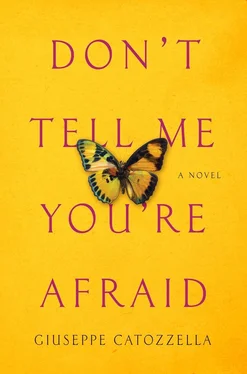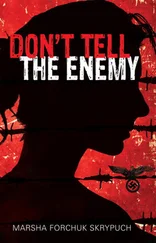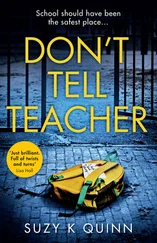Everything is white in Mogadishu.
The walls of the buildings, riddled by bullets or nearly demolished by bombs, are almost all white, or gray or ocher or yellowish; in any case, light colored. Even the poorest dwellings, like ours, made of mud and brushwood, soon become white like the dust of the streets, which settles on the facades as on everything else.
When you run through Mogadishu, you raise a cloud of fine, sandy powder behind you. Alì and I created two white trails that very slowly vanished toward the sky. We always ran the same route; those streets had become our personal training field.
When we ran past the rundown bars where old men sat playing cards or drinking shaat, tea, our dust would end up in their glasses. Every time. We did it on purpose. Then they’d pretend to get up to run after us, and we’d speed up and leave them behind in no time, raising still more dust.
It had become a game — we laughed and the old men laughed a little too. We had to be careful where we stepped, however, because at night they burned the garbage and the next morning the streets were littered with charred remains. Gas cans, oil tins, shreds of tires, banana peels, broken bottles, anything you can think of. In the distance, as we ran, we could see scores of smoldering heaps, countless little erupting volcanoes.
Before slipping into the narrow alleys leading to the big street that hugged the coast, we always went along Jamaral Daud, a broad two-lane boulevard with the usual dusty surface and a row of acacia trees on either side.
We loved to run by the national monument, the parliament, the national library, the courthouse. Lined up in front of the complex were the street vendors, their colorful cloths spread out on the ground, displaying their wares: everything from tomatoes and carrots to windshield wipers. The men dozed beneath the trees lining the boulevard until a customer showed up, and when we ran by they looked at us as if we were a couple of martians. They made fun of us.
“Where are you two rascals going in such a hurry? It’s a holiday. Have fun, take it easy,” they called as we sped past.
“Home to your wife, you old sleepyhead!” Alì replied. Sometimes they threw a banana at us, or a tomato or an apple.
Alì would stop, pick them up, and then sprint away.
The race was an event. To me it seemed like it was even more important than July 1, our national holiday, the day we declared independence from Italian colonizers.
As usual, I wanted to win, but I was only eight years old, and everyone was participating, even the adults. At the race the year before I’d finished in eighteenth place, and this time I wanted to cross the finish line in the top five.
When my father and mother saw me so motivated, from the time I was little, they tried to figure out what was going through my head.
“Will you win again this time, Samia?” Aabe Yusuf, my father, teased me. Sitting in the courtyard on a woven straw chair, he pulled me to him and ruffled my hair with those huge hands of his. I enjoyed doing the same thing to him, running my short, skinny little fingers through that thick black mane or pounding his chest through the white linen shirt. Next he would grab me and, big and strong as he was, lift me up in the air with only one arm, then set me back down on his lap.
“I haven’t won yet, Aabe, but I will soon.”
“You look like a fawn, you know that, Samia? You’re my favorite little fawn,” he’d say then, and hearing his big deep voice become tender made my knees tremble.
“Aabe, I’m swift as a fawn, I’m not a fawn….”
“So tell me…. How do you think you can win against those kids who are bigger than you?”
“By running faster than them, Aabe! Maybe not yet, but someday I’ll be the fastest runner in all of Mogadishu.”
He would burst out laughing, and if my mother, Hooyo Dahabo, was nearby, she too would laugh out loud.
But right after that, while he was still holding me tight, Aabe would become melancholy. “Someday, of course, little Samia. Someday…”
I tried to convince him. “You know, Aabe, some things you just know. I’ve known since before I could talk that someday I’ll be a champion. I’ve known since I was two years old.”
“Lucky you, my little Samia. I, however, would just like to know when this damn war will end.”
Then he put me down and went back to staring straight ahead, his face grim.

THE WAR NEVER MATTERED much to me and Alì. Let them shoot each other in the street; it had nothing to do with us. Because the war couldn’t take away the only thing that was important: what he was to me and what I was to him.
War can take away other things, but not that. For example, it took the sea away from me. The first thing I smelled when I was born was the smell of the sea, which traveled straight from the coast all the way to the courtyard of the house, the saltiness that still clings to my hair and skin, the moisture that permeates every molecule of air.
Yet I touched the sea only once. I know it’s water, that if you jump into it you’ll get all wet, like when you go to the well, but until I do it I don’t believe it.
Sometimes I touched the sand, even though I shouldn’t have. Every now and then Alì and I, taking our time as we ran through the narrow alleys that only he knew, would approach the sea’s vast expanse in the afternoon. We’d stop at the side of the big road that runs from north to south along the entire length of the shoreline and, hidden behind a truck or an armored tank, would stay there for hours watching the waves move back and forth, teasing the sunlight that reflected everywhere. We were dying to dive in. That immensity was there in front of our eyes and we couldn’t go in it.
Once or twice, however, Alì became impatient. I could tell by the way he kept rubbing his hands together without letting up. He looked around, took me by the arm, and told me to run. Just that one word: “run.” Those times we crossed the big road and sat on the sand. Crazy! They could shoot us: The beach is one of the militia’s favorite spots; it’s wide open; the rifles’ bullets have a straight shot.
But we’d pretend we were normal kids who didn’t think about such things and could just play.
The sand was hot and fine like specks of gold. We didn’t see a soul nearby. We started tussling around, trying to get the sand all over each other, in our black curly hair, in our clothes, everywhere. After he rolled me over two or three times, Alì laughed like a madman; he looked like a lunatic. I had never seen him like that. He opened his mouth and displayed his big white teeth, saying, “You look like a meatball covered with corn flour!” and he went on laughing with that funny face of his: flat nose, big fleshy lips and small, close-set little eyes.
“You’re a corn flour — covered meatball!” he repeated.
I tried to squirm free but I couldn’t; he was too strong for me, even though he had no muscles: tall as a string bean and all bones. He kept me pinned on the sand while I tried to wriggle loose, pretending he wanted to kiss me on the mouth as he leaned forward, stretching his head out like a turtle. I turned my face right and left, disgusted, but when he got close, instead of kissing me Alì said “Boo!” and blew sand in my eyes.
I hated him.
One time, only once, gripped by a power greater than us, we slowly approached the water. One small step after another, almost without realizing it.
It was a beautiful expanse, gigantic, like a sleeping elephant breathing deeply. The long waves made an amazing whoosh that resembled a voice; they sounded like the small shells in the glass jar that Aabe had given Hooyo when they were engaged, which she kept hidden in a wooden cabinet in their room. We would go pick up the jar and turn it over slowly from one side to the other to hear the voice of the sea.
Читать дальше





![Ally Carter - [Gallagher Girls 01] I'd Tell You I Love You But Then I'd Have to Kill You](/books/262179/ally-carter-gallagher-girls-01-i-d-tell-you-i-lo-thumb.webp)







